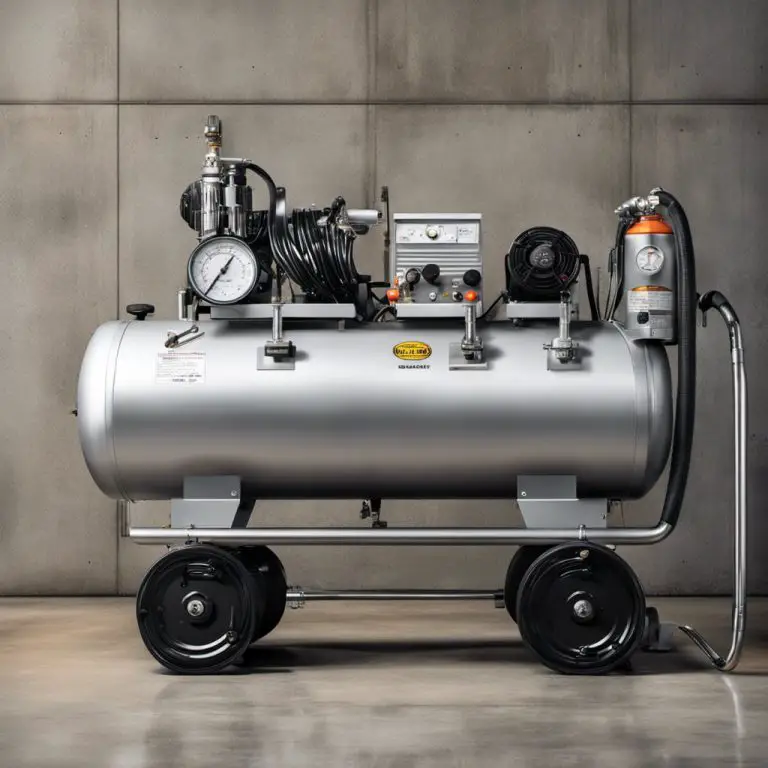Air compressor tanks are essential components of air compressors and are used in various industries. They are designed to store compressed air and release it when needed. However, like any other equipment, air compressor tanks have a lifespan and will eventually need to be replaced. The question is, how long do air compressor tanks last?
The lifespan of an air compressor tank depends on several factors, including the frequency of use, maintenance, and the quality of the tank itself. Generally, a well-maintained air compressor tank can last anywhere from 10 to 30 years. However, smaller tanks tend to wear out sooner than larger ones because they require more frequent refills. Additionally, the temperature and humidity of the environment can also affect the life of an air compressor tank.
It’s important to note that an expired air compressor tank can be dangerous. Signs of an expired tank include rust, poor maintenance, physical damage, and an expired date. If an air compressor tank shows any of these signs, it’s best to replace it. In this article, we will explore how long air compressor tanks last, what factors affect their lifespan, and how to determine if it’s time to replace them.
Understanding Air Compressor Tanks
Air compressor tanks are an essential component of any air compressor. They are designed to hold pressurized air, which is then used to power pneumatic tools and other equipment. Air compressor tanks come in various sizes and shapes, depending on the application and the amount of air required.
The tanks are made of a variety of materials, including steel, aluminum, and composite materials. Steel tanks are the most common type of tank and are known for their durability and strength. Aluminum tanks are lightweight and ideal for portable applications. Composite tanks are relatively new to the market and are made of a combination of materials, including carbon fiber and fiberglass.
Air compressor tanks are designed to withstand more pressure than the maximum PSI rating of the compressor, for safety’s sake. However, over time, the tanks can wear down due to wear and tear, rust, poor maintenance, and physical damage. It is important to inspect the tank regularly for signs of wear and tear and to replace the tank if necessary.
Most countries mandate that air compressor tanks be certified or replaced every ten years from the date of manufacture, according to regulations. The tank’s certification is usually indicated by a retest date, which can be found on the tank’s label.
In summary, air compressor tanks are an essential component of any air compressor. They come in various sizes and shapes and are made of different materials. It is important to inspect the tank regularly for signs of wear and tear and to replace the tank if necessary.
Factors Influencing the Lifespan of Air Compressor Tanks
Air compressor tanks can last for a long time, but their lifespan depends on various factors. In this section, we will discuss the key factors that influence the lifespan of air compressor tanks.
Material Quality
The quality of the material used to make the air compressor tank is a critical factor that determines its lifespan. Tanks made from high-quality materials tend to last longer than those made from low-quality materials. Stainless steel and aluminum are commonly used materials for making air compressor tanks due to their durability and corrosion-resistant properties.
Maintenance Practices
Proper maintenance practices can significantly extend the lifespan of an air compressor tank. One of the essential maintenance practices is draining the moisture from the tank regularly. Moisture buildup can cause corrosion and rust, which can weaken the tank’s structure and reduce its lifespan. Other maintenance practices include checking and replacing faulty parts, lubricating moving parts, and cleaning the tank’s exterior.
Frequency of Use
The frequency of use is another critical factor that influences the lifespan of an air compressor tank. Tanks that are used frequently tend to wear out faster than those that are used less frequently. This is because frequent use leads to more pressure cycles, which can cause fatigue and stress on the tank’s structure. Additionally, tanks that are used in harsh environments or subjected to extreme temperatures may wear out faster than those used in less demanding conditions.
In summary, the lifespan of an air compressor tank depends on various factors, including material quality, maintenance practices, and frequency of use. By taking proper care of the tank and using it appropriately, users can extend its lifespan and avoid the need for premature replacement.
Signs of a Failing Air Compressor Tank
Air compressor tanks are designed to withstand high pressure and last for years. However, over time, they can develop issues that can lead to catastrophic failure. It’s important to be aware of the signs of a failing air compressor tank to prevent accidents and ensure safe operation.
Here are some common signs that your air compressor tank may be failing:
- Rust: Rust is a common problem with air compressor tanks, especially if they are exposed to moisture. If you notice rust on the tank, it’s a sign that the tank may be corroding from the inside out. This can weaken the tank and increase the risk of failure.
- Leaks: Leaks are an obvious sign that something is wrong with your air compressor tank. If you notice air leaking from the tank or fittings, it’s important to address the issue immediately. Leaks can be caused by a variety of factors, including cracks, corrosion, and loose fittings.
- Bulging: If you notice that your air compressor tank is bulging, it’s a sign that the tank is under too much pressure. This can be caused by a faulty pressure relief valve, overfilling the tank, or a malfunctioning regulator. If the tank continues to bulge, it can eventually rupture, causing serious injury or property damage.
- Strange Noises: If you hear strange noises coming from your air compressor tank, it’s a sign that something is wrong. This can include hissing, popping, or banging sounds. These noises can be caused by a variety of factors, including leaks, corrosion, and faulty valves.
- Age: While air compressor tanks can last for years, they do have a limited lifespan. Most tanks are designed to last between 10 and 15 years. If your tank is approaching or exceeding this age, it’s important to have it inspected by a professional to ensure that it’s still safe to use.
By being aware of these signs, you can take steps to prevent accidents and ensure the safe operation of your air compressor tank. If you notice any of these issues, it’s important to address them immediately to prevent further damage and ensure your safety.
How to Extend the Life of an Air Compressor Tank
Air compressor tanks are an essential component of an air compressor system. Proper maintenance and care can extend the lifespan of the tank and prevent damage or accidents. Here are some ways to extend the life of an air compressor tank:
Regular Inspections
Regular inspections of the air compressor tank can help identify any potential issues before they become major problems. Inspect the tank for any signs of rust, corrosion, or physical damage. Check the tank’s pressure gauge to ensure it is within the recommended range. Inspect the tank’s safety valve to ensure it is functioning correctly.
Proper Cleaning
Cleaning the air compressor tank regularly can help prevent rust and corrosion. Drain the tank regularly to remove any moisture or condensation that may have accumulated inside. Use a soft-bristled brush to clean the inside of the tank. Avoid using harsh chemicals or abrasive materials that can damage the tank’s surface.
Timely Repairs
Timely repairs can prevent minor issues from becoming major problems. If you notice any signs of damage or wear and tear, address them immediately. Replace any damaged or worn-out parts to prevent further damage to the tank.
Regular maintenance and care can extend the life of an air compressor tank. By performing regular inspections, proper cleaning, and timely repairs, you can ensure the safe and efficient operation of your air compressor system.
Conclusion
In conclusion, the lifespan of an air compressor tank can vary depending on several factors. The tank’s size, frequency of use, and maintenance all play a role in how long it will last. Smaller tanks tend to wear out sooner than larger ones because they need to refill more often.
According to the search results, the average lifespan of an air compressor tank is anywhere from 5 to 30 years. However, it’s important to note that this is just an estimate and not a guarantee. Proper maintenance and care can help extend the life of the tank.
Signs of an expired air compressor tank include rust, physical damage, and elements of rust in liquid. It’s important to regularly inspect the tank and replace it if any of these signs are present.
If you’re unsure if your air compressor tank is safe, it may be worth the cost of testing if it’s an expensive, professional-grade compressor. However, if it’s an old tank, it may be more cost-effective to replace it instead of testing it.
Overall, it’s important to prioritize safety when it comes to using an air compressor tank. Regular maintenance and inspections can help ensure the tank is safe to use and prevent any potential accidents.



